Ollie V. was not looking to adopt another cat, in fact, they had been actively trying not to “foster fail.”
Having been an ASPCA foster caregiver since April 2020, fostering eight cats alongside their two resident cats, Ollie had “carved out a niche” for shy and special needs cats. So, when they came across a posting for Dubby, a blind and deaf cat, on a foster Facebook page, they immediately were drawn to her. However, in an effort not to add another feline to their mix, Ollie took to social media.
“I actually jokingly posted on my personal Facebook the link to her profile saying, ‘somebody please adopt this cat so I don’t.’ But I just kept thinking about her. It sort of spiraled from there,” Ollie recalls.

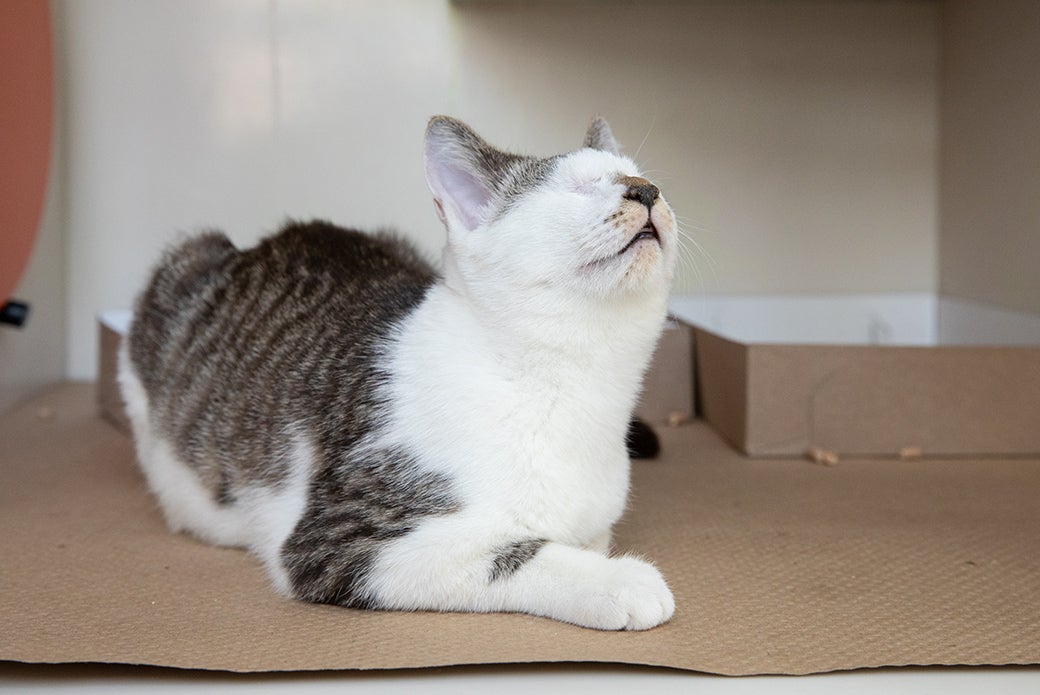
Needing Someone to Take a Chance
At three years old, Dubby had not had an easy life. As a kitten, she was brought to the ASPCA very sick with a slew of health problems, including Congenital Vestibular Syndrome—a congenital disease we believe she was born with that affects her inner ear, causes her to be off balance and likely is the reason she is also deaf. In addition, when we first met Dubby she had severely damaged eyes, resulting in a double enucleation to make her more comfortable and to prevent further complications.
Though, through it all, Dubby remained a resilient kitten who learned how to navigate the world in her own way.


After seven months in our care, Dubby was adopted, though unfortunately, through no fault of her own, was returned two years later.
Now back in our care, our incredible Matchmakers knew they had to find the right adopter for our special girl. In hopes of boosting her chances of finding the right person, we posted Dubby’s profile on multiple social media platforms including the foster Facebook group where Ollie came across her.
Ollie fell in love with Dubby and eventually adopted her, knowing they would be able to give her the life she deserves.

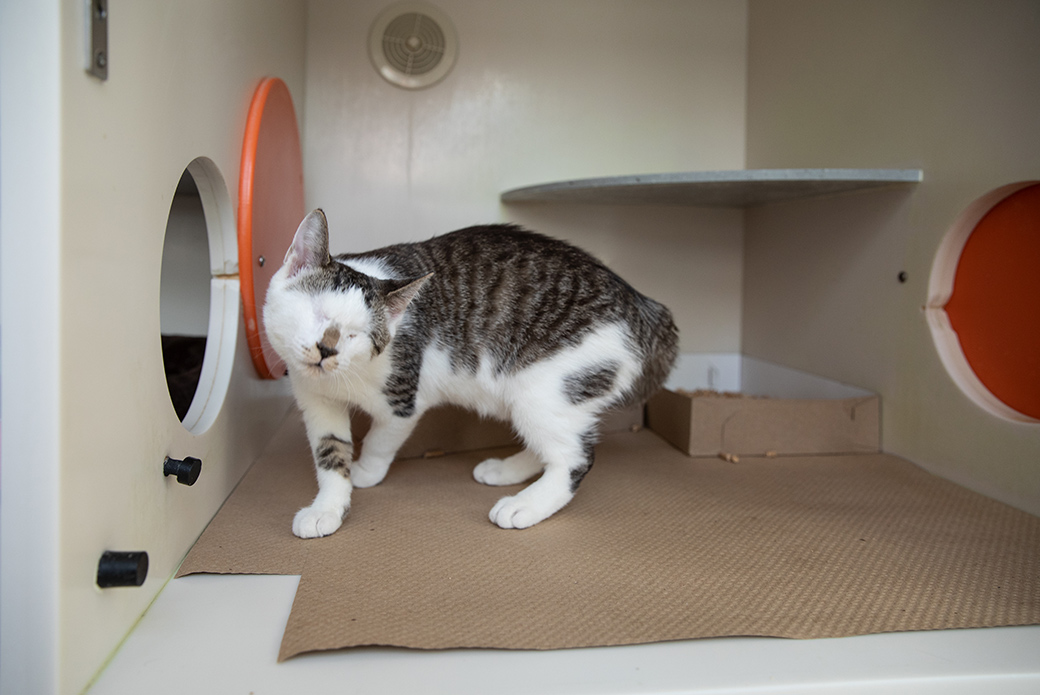
“I love the babies that are going to need a little extra care and patience,” Ollie explains. “I felt like I was really suited—or she was really suited for me. It was going to be a new adventure.”
A New Adventure
Ollie’s first adventure? Figuring out how to show Dubby that she’s in a safe place when she can’t see or hear them. That, and changing Dubby’s name to Harriett, or Harry for short!
Being an experienced caregiver of shy cats, Ollie knew that associating the “good things” (like food) with pets would help Harry understand positive reinforcement. Ollie also gives Harry the chance to smell them and acknowledge that they are there by having a heavier footfall before petting her so that she’s not afraid.
“You would think she would be a lot more afraid of life than she actually is,” Ollie tells us. “Her nose is just up in the air, sniffing the world and I think that’s indicative of who she is. As a cat she’s facing some struggles and she wasn’t dealt the best hand but she’s just attacking it nose-first and she doesn’t let it slow her down.”

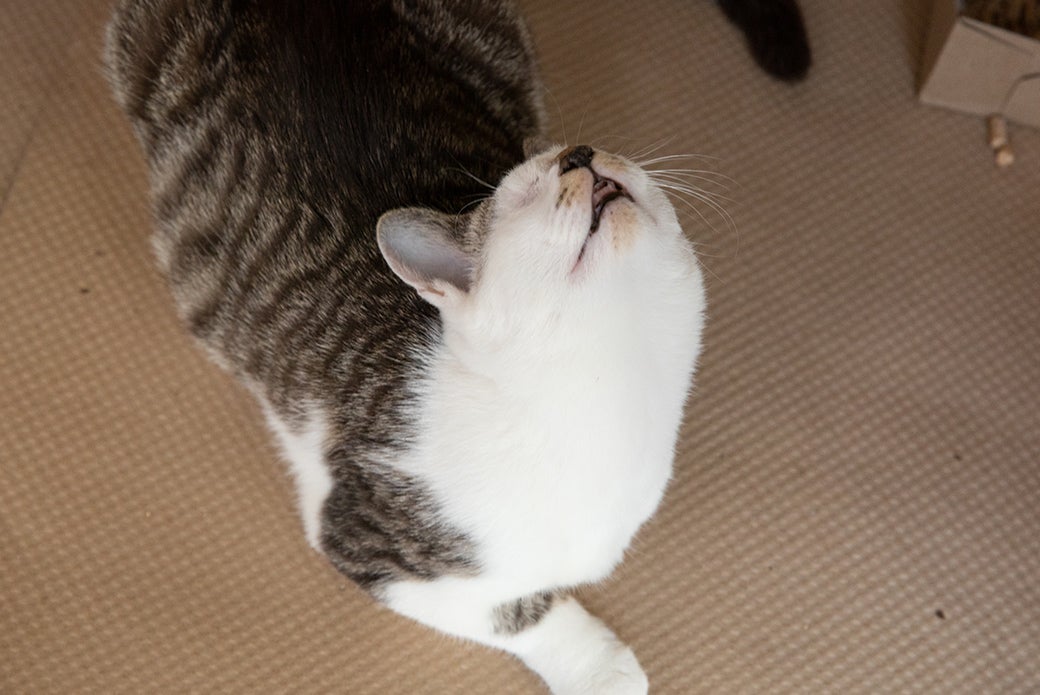
It only took Harriett about two days to settle into her new home, exploring and trying to figure out where everything is. Most importantly, in those two days, Harriett figured out where the sunspot was. Since finding it, she can be found there every single day without fail.
When it came to learning where all the furniture was around the apartment, Harriett moved slowly and deliberately. If she bumped into things, she would try again. “Sort of like when the Roomba bumps into the wall,” Ollie says. If Harry loses her way, she has learned how to redirect herself.
“She does this adorable spinning where she’s trying to place herself. She doesn’t come off as lost or scared, she’s very precocious and wants to see what’s going on around her—well not really see, but experience what’s going on around her in the way that she’s capable of doing.”

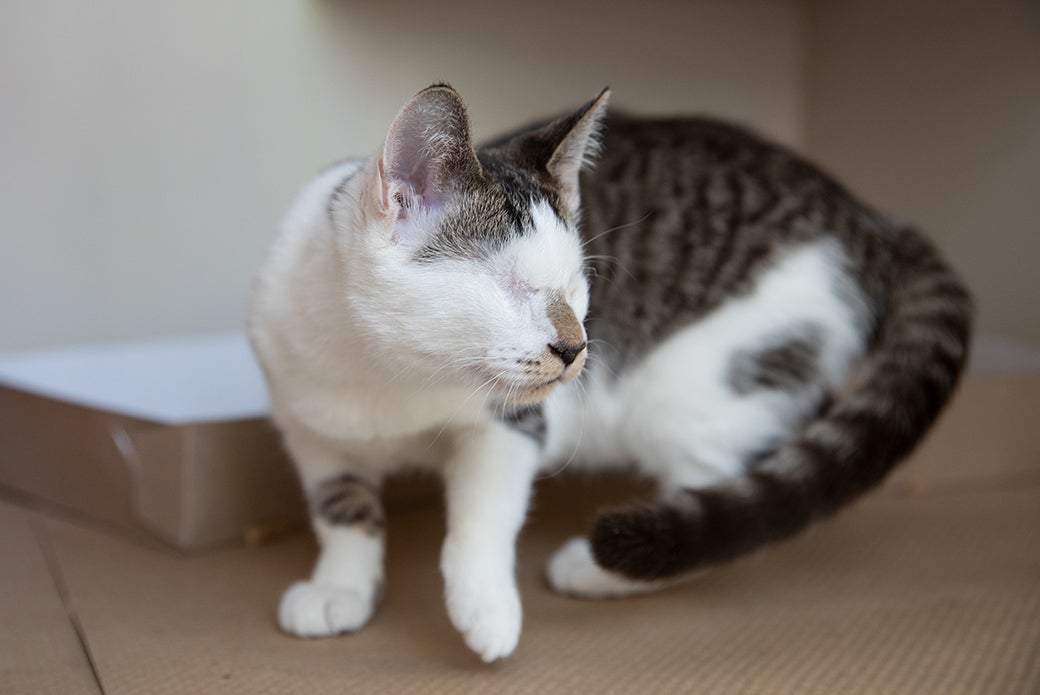
A Family of Four
While Ollie was working to make sure Harry was comfortable with them and in the apartment, Ollie’s two other cats, Hobbes and Nick, were joining in on the new adventure by learning to accept a third cat into their family.

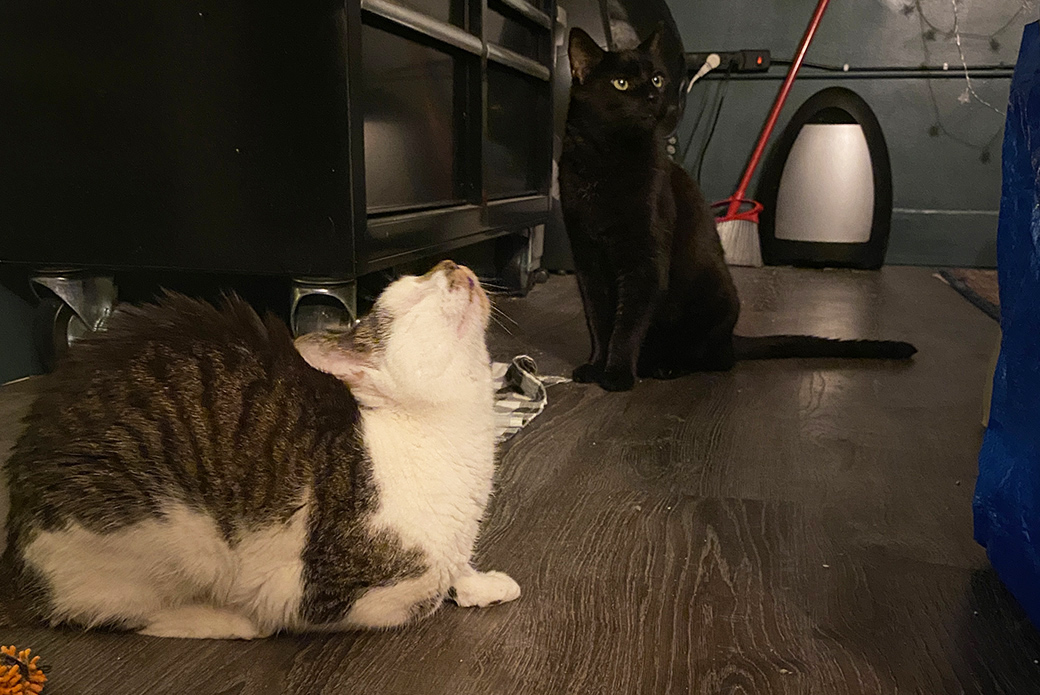
Harriett and Hobbes.
Hobbes, the oldest of the cats at 17 years old, knows there is something different about Harry. He approaches her very slowly and respects her space. Unlike his older brother, Nick, who only has one eye and who Ollie considers a helper cat when socializing their foster cats, doesn’t know there is anything wrong with Harry.
“He’s upset she doesn’t play with him like the previous foster cats have,” Ollie tells us. “He just sits and hisses at her. I just look at him and I’m like, ‘Buddy, she cannot see you and she cannot hear you and she does not care.’ But I have caught him sneaking up to her and sniffing her butt when she’s sleeping, so it’s getting there but it will be a slow process.”

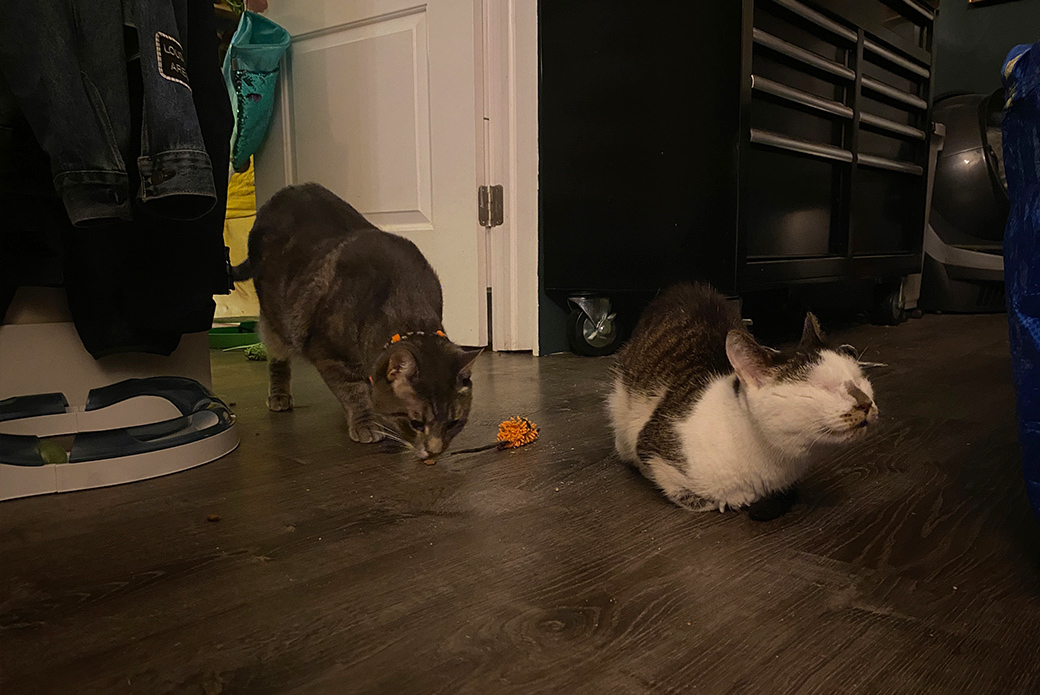
Nick sneaking up on Harriett.
While the process may be slow and steady, Ollie has also caught Harriett sneaking of out the bedroom to follow Nick’s scent. Sometimes, Harriett gets a bit too close for Nick’s liking so he’ll either back off or ask for space by giving a very gentle “head boop” to tell her she’s too close.
Knowing If Adopting a Differently-Abled Pet is Right for You
Having been an ASPCA foster for over a year, Ollie knows the importance of both adopting and fostering pets, especially those that are differently-abled.
“There are so many pets in the world that are in shelters and rescues who are looking for the perfect families,” Ollie explains. “These pets come with these histories that make them who they are, just like people, and it creates such a dynamic relationship between the family and the pet that I don’t think you can get anywhere else.”
Through their fostering, Ollie has spent a lot of time dealing with shy and special needs cats, but none have compared to Harry.

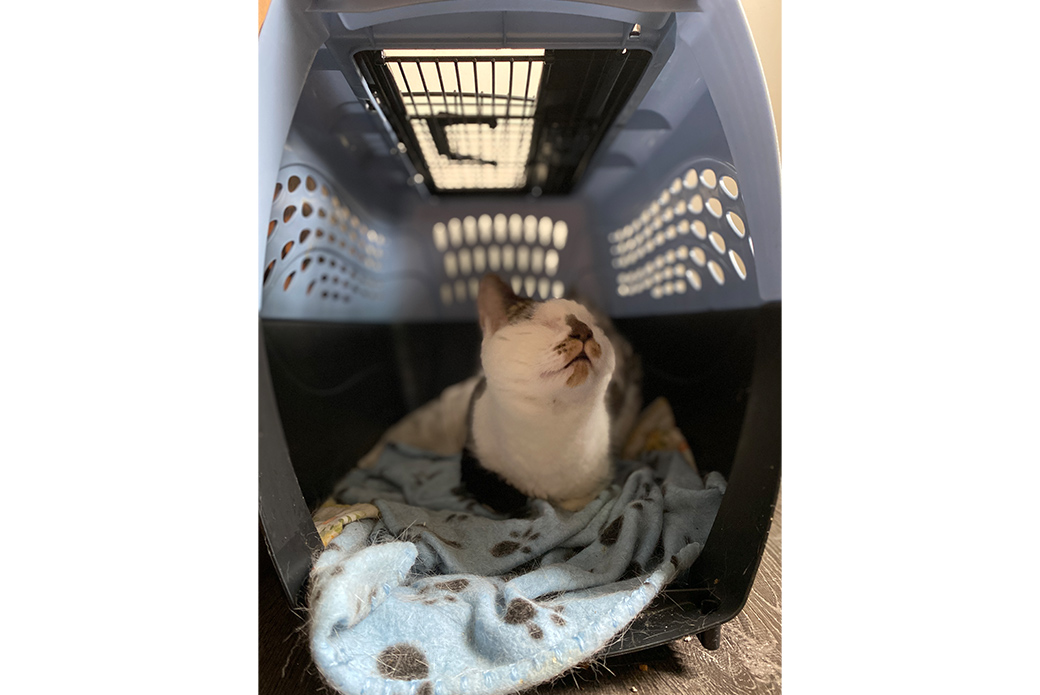
Ollie advises that when thinking about adopting a differently-abled pet, to “really consider everything and when you think you’ve considered everything, consider it a little bit more.”
They go on to explain that there are things you may not realize that will have to change, like the amount of time you can stay away from home or having to administer medication daily, but also consider the amount of joy they will bring “because even though they may have a special need, that special need comes with a little bit extra that a fully capable pet may not have.”
Harriet has brought both joy and a new way of looking at the world to Ollie’s life.
“When I saw her initially listed in the group, something intangible pulled at my heartstrings and something inside of me said, ‘this pet is supposed to be in your life,’” Ollie explains. “And I tried to make that go away, but it wouldn’t let go and I went with that feeling and through the challenges and the surprises, all of it, I have not regretted following that feeling.”
In addition to joy and a whole new outlook, Harry has brought a calmer energy to the home and, because of the challenges she has faced, there is “a resilient patience that comes along with her” that the whole family is picking up on.

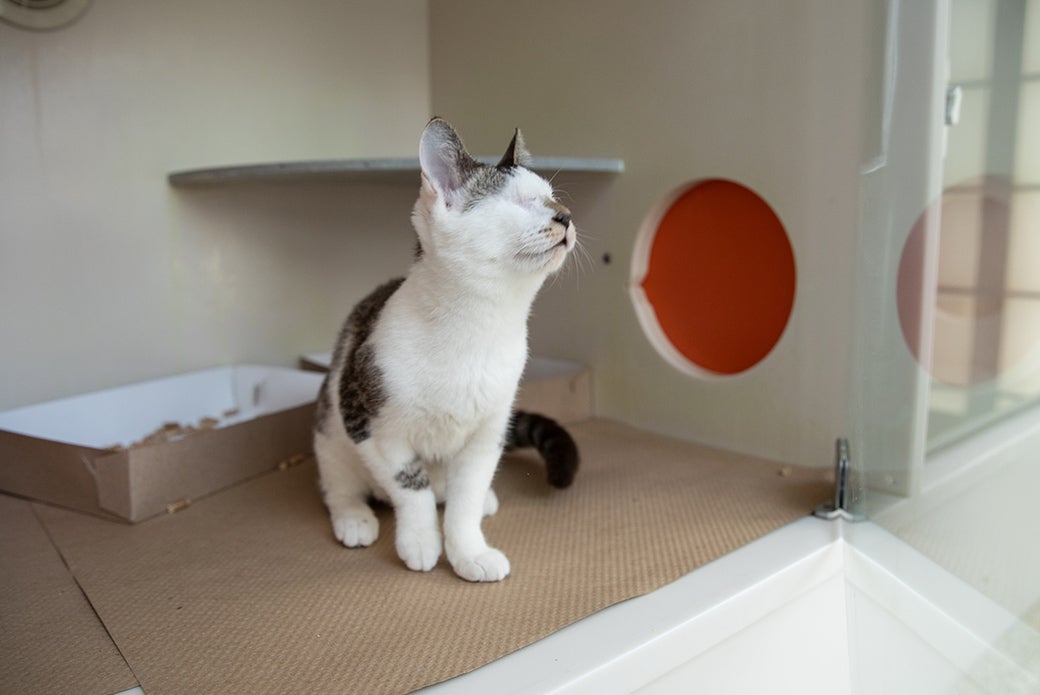
“There’s that intangible feeling that the perfect pet can bring to your life and they may not, on the surface, seem perfect, but if you follow that feeling it’s so much more rewarding and enriching to give them that love and to receive their love in return.”
Source: Read Full Article
